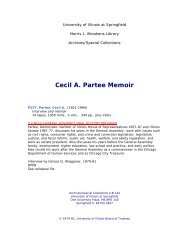harold a. katz memoir volume 1 - University of Illinois Springfield
harold a. katz memoir volume 1 - University of Illinois Springfield
harold a. katz memoir volume 1 - University of Illinois Springfield
Create successful ePaper yourself
Turn your PDF publications into a flip-book with our unique Google optimized e-Paper software.
camp also. They tend to attract a type <strong>of</strong> person who is not too fraternity/sorority-dance<br />
oriented. I played tennis. I went to movies, but not the Chez Paree in Chicago, and night-<br />
clubs, and that sort <strong>of</strong> activity. I was more <strong>of</strong> a hayseed.<br />
Q: Let's see, the Aragon and the Trianon were going full blast then. Did you get out to<br />
those?<br />
A: Oh, I did occasionally. I did like to dance. It's pleasant to think now about those big<br />
dance halls.<br />
Q: Do you remember any <strong>of</strong> the big bands that you saw there?<br />
A: I remember Dorsey and Kruppa and Wayne King from that period.<br />
Q: What about the legitimate theater. Did you attend much <strong>of</strong> that?<br />
A: Yes. I went to a number <strong>of</strong> plays. Today, the legislature's funding <strong>of</strong> the arts has pro-<br />
duced a real renaissance <strong>of</strong> the theater in the Chicago area. The semi-pr<strong>of</strong>essional theater<br />
that abounds in Chicago now hardly existed then.<br />
Q: Was there a symphonic orchestra at the <strong>University</strong> <strong>of</strong> Chicago?<br />
A: No. There was, <strong>of</strong> course, the Chicago Symphony. I remember once attending "Lady<br />
in the Dark" at the Civic Opera House, with Gertrude Lawrence and Danny Kaye. I sat<br />
with my date in the very last row in the very top balcony. You need a telescope to be able<br />
to see what's going on down there on the stage. One row back, and I would have been out<br />
in the lobby.<br />
Q: Where did you meet Miss Lewison?<br />
A: She worked at the War Labor Board. We met there, and that's what produced the sparks<br />
that produced the marriage that produced the family.<br />
Q: Was she from Chicago?<br />
A: She was from Chicago. Her father was a fine internist who taught at the <strong>University</strong><br />
<strong>of</strong> <strong>Illinois</strong>. He had died by this time, however. She lived with her mother. She and her<br />
brother, Edward, an outstanding surgeon who taught at Hopkins and who specializes in<br />
breast cancer in Baltimore, and her mother, Julia, were the only members <strong>of</strong> her immediate<br />
family.<br />
Q: And so you just got to know each other in the activity there?<br />
A: Yes. I edited the newspaper at the War Labor Board. One day, I got a little note from<br />
someone 1 didn't know, telling me how much she liked a particular article I had written<br />
for the newspaper. Of course, I was very pleased to have anybody take notice <strong>of</strong> what was<br />
in the newspaper. That was Ethel Mae who had sent me the note. Soon, she and I got<br />
to be friends, and she attended some <strong>of</strong> the economics graduate school classes that I attended<br />
at the <strong>University</strong> <strong>of</strong> Chicago. She had graduated from the <strong>University</strong> <strong>of</strong> Chicago. And on<br />
July 21,1945, we were married in Chicago.<br />
Q: So it was kind <strong>of</strong> a whirlwind sort <strong>of</strong> thing, a year, or a year and a half, or so.<br />
A: Right. I'd known her a good many months. But I did propose marriage to her relatively<br />
soon, uncharacteristically soon for me.<br />
Q: Was she active in supporting Wallace, also?

















